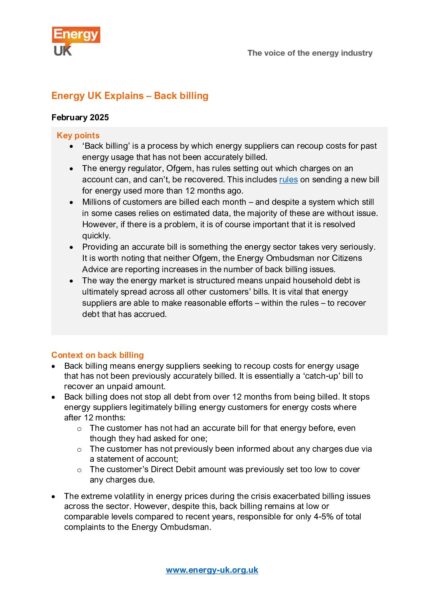Key points
- ‘Back billing’ is a process by which energy suppliers can recoup costs for past energy usage that has not been accurately billed.
- The energy regulator, Ofgem, has rules setting out which charges on an account can, and can’t, be recovered. This includes rules on sending a new bill for energy used more than 12 months ago.
- Millions of customers are billed each month – and despite a system which still in some cases relies on estimated data, the majority of these are without issue. However, if there is a problem, it is of course important that it is resolved quickly.
- Providing an accurate bill is something the energy sector takes very seriously. It is worth noting that neither Ofgem, the Energy Ombudsman nor Citizens Advice are reporting increases in the number of back billing issues.
- The way the energy market is structured means unpaid household debt is ultimately spread across all other customers’ bills. It is vital that energy suppliers are able to make reasonable efforts – within the rules – to recover debt that has accrued.
Context on back billing
- Back billing means energy suppliers seeking to recoup costs for energy usage that has not been previously accurately billed. It is essentially a ‘catch-up’ bill to recover an unpaid amount.
- Back billing does not stop all debt from over 12 months from being billed. It stops energy suppliers legitimately billing energy customers for energy costs where after 12 months:
- The customer has not had an accurate bill for that energy before, even though they had asked for one;
- The customer has not previously been informed about any charges due via a statement of account;
- The customer’s Direct Debit amount was previously set too low to cover any charges due.
- The extreme volatility in energy prices during the crisis exacerbated billing issues across the sector. However, despite this, back billing remains at low or comparable levels compared to recent years, responsible for only 4-5% of total complaints to the Energy Ombudsman.
What customers can do if they are unsure about their bill
- It is important that customers contact their supplier as soon as they become aware of any issues in their billing.
- This is the only way energy suppliers can understand their customers’ individual circumstances – and provide the customer with appropriate additional support tailored to their needs.
Suppliers’ duty of care
- Energy UK does not, and never will, defend instances where suppliers have got it wrong. However, energy suppliers take their duty of care to customers extremely seriously and when mistakes happen, should address issues quickly.
- Suppliers have invested in increasing and improving their customer service in response to a huge increase in calls and enquiries during an extended period of high energy bills. This has helped achieve a drop in the number of complaints made to Energy Ombudsman as well as improved performance, as indicated by Ofgem statistics.
- Ofgem data shows that customer satisfaction with energy suppliers has been improving.
- Ease of understanding an energy bill has risen to a record high since 2018.
- Reported accuracy of bill has risen to a joint record high.
- Complaints per 100k customers were 21% lower in Q3 2024 than the recent peak in Q1 2023.
- The Ombudsman has seen a 27% drop in billing complaints in the third quarter of 2024, compared to the same period in 2023.
Additional support from suppliers and background
- In 2020, Energy UK launched the Vulnerability Commitment, which commits signatories each year to driving continuous improvement in customer service and care, with their efforts independently scrutinised each year by an expert panel.
- In November 2024, suppliers again pledged to help customers struggling with their bills this winter, committing more than £500 million, comprising temporary support that will need to be repaid, enhanced debt-write off schemes and hardship funds, in addition to working with charities and debt support agencies to provide additional expert help to customers in need.
- In addition to the financial commitment, 15 suppliers signed the Winter 2024 Commitment, which commits them to ensure the utmost standards of customer support, service and care.
- In October, Energy UK published the 2024 Vulnerability Commitment Good Practice Guide, which highlighted the year’s developments in innovative methods suppliers are using to support customers in vulnerable circumstances.
- Energy UK previously administered the Code of Practice for Accurate Bills (Billing Code). This code represented a series of voluntary commitments developed to go beyond the supplier licence conditions of the time and applied to domestic customers. The Billing Code included a commitment on back billing until this was superseded by an Ofgem licence condition in 2018.
- Following a review that included organisations such as Citizens Advice, Ofgem and Ombudsman Services Energy, the Billing Code was closed in 2019. The review found that suppliers’ performance over the years of monitoring had improved substantially, and that a consistently high standard had been maintained for such a time that the Code could be closed.


